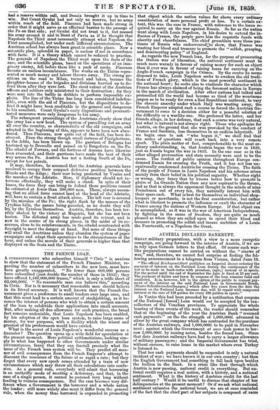THE FRENCH LOAN.
A. CORRESPONDENT who subscribes himself " Civis " is anxious to show that the statement of the French Finance Minister, re- garding the number of subscribers to the new loan, must have been greatly exaggerated. " No fewer than 690,000 persons have subscribed (just double the number of those in 1855) ; they have offered 1,549,000,000 francs," which is only a trifle short of 62,000,0001. " No reasonable man can believe this," according to Civis. Nor is it necessary that reasonable men should believe in its literal accuracy. It is well known that the French Go- vernment gives a preference to small tenders over large ones, and that this must lead to a certain amount of stockjobbing, as it be- comes the interest of persons who wish to obtain a certain amount of the loan to subdivide their applications into small accounts. But, after making all due allowance for such practices, the broad fact remains undeniable, that Louis Napoleon has been enabled, by his adoption of the open loan system, to raise large sums of money, for war purposes, with a facility which the wisest and greatest of his predecessors would have envied. What is the secret of Louis Napoleon's wonderful success as a financier ? The question opens up a wide field for speculation at the present moment. Mere political arithmeticians, looking sim- ply to what has happened to other Governments under similar circumstances, fancy that they can foretell precisely what the issue of the French loan system will be. They predict all man- ner of evil consequences from the French Emperor's attempt to discount the resources of the future at so rapid a rate ; but they forget that every new epoch comes attended by a train of new circumstances which may throw all their calculations into confu- sion. As a general rule, everybody will admit that borrowing is an nnthrifty mode of meeting a deficiency, and that, in the case of a single person, it cannot be pursued very long without leading to ruinous consequences. But the case becomes very dif- ferent when a Government is the borrower and a whole nation the lender ; still more widely also must it differ from the general rule, when the money thus borrowed is expended in promoting that object which the nation values far above every ordinary consideration of mere personal profit or loss. To a certain ex- tent, this was the case in France, with reference to the loans re- quired to carry on the war against Russia. So far as the nation went along with Louis Napoleon, in his desire to extend the in- fluence of France, the people gave him the requisite funds with alacrity and cheerfulness. The chief grumblers were those par- tisans of Russia who endeavoured-',to show, that France was wasting her blood and treasure to promote the " selfish, grasping, and domineering policy " of England. As regards the new French loan, for the purpose of prosecuting the Italian war of liberation, the national sentiment must be much more warmly in favour of raising money for such an object than it ever was in favour of raising loans for carrying on the Anglo-French campaign in the Crimea. By the course he seems disposed to take, Louis Napoleon seeks to awaken the old tradi- tions of French glory, which is the most powerful sentiment in the national heart ; he seeks also to vindicate the character which France has always claimed of being the foremost nation in Europe in the march of civilization. After other nations had talked and protocolled till the world had become so tired of the wearisome jargon as to be ready for even a Red Republican outbreak, to vary the chronic anarchy under which Italy was wasting away, the French Emperor adopted such a course as forced the Austrian Go- vernment to come to a decision either for a peaceful solution of the difficulty or a warlike one. She preferred the latter, and her friends allege, in her defence, that such a course was very natural, but what is natural is not always right. Those who apologize for Austria, on the ground that she was provoked by the conduct of France and Sardinia, lose themselves in an endless labyrinth. If we begin once to ask " who began it," we shall find that the series of questions will reach back into a very remote epoch. The plain matter of fact, comprehensible to the most or- dinary understanding, is, that Austria began the war in 1859, just as Russia began the war in 1853. In the one case as in the other alleged provocation and state necessity were said to be the cause. The verdict of public opinion throughout Europe con- demned Russia for crossing the Pruth, and it has not less un- equivocally condemned Austria for crossing the Ticino. The faith of the people of France in Louis Napoleon and his schemes arises mainly from their belief in his political sagacity. Whether right or wrong, they fancy that he knows better how to promote in gloire of La Grande Nation than any new aspirant to the throne, and as that is always the uppermost thought in the minds of nine Frenchmen out of every ten, they naturally intrust him with their spare cash. What is best for themselves as individual shop- keepers or merchants, is not the first consideration, but rather what is likeliest to promote the influence or exalt the character of France among the nations of Western Europe. If that object can be accomplished, as it was in the war of American Independence, by fighting in the cause of freedom, they are quite as much pleased as when they are called upon to spend their blood and treasure in promoting the selfish and insane ambition of a Louis the Fourteenth, or a Napoleon the Great.


































 Previous page
Previous page